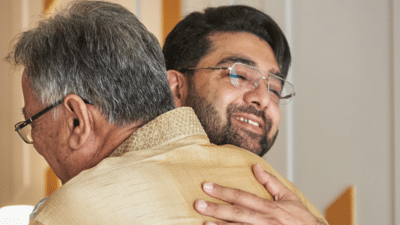When is Eid-ul-Fitr 2025? Key Dates, Historical Background, and Significance Explained

Eid-ul-Fitr, also known as the 'Festival of Breaking the Fast,' is one of the most significant Islamic celebrations observed by millions of Muslims worldwide. It marks the end of Ramadan , a sacred month of fasting, prayer, and reflection. The date of Eid-ul-Fitr is determined by the Islamic lunar calendar and depends on the sighting of the new moon. In 2025, Eid-ul-Fitr is expected to fall on Monday, March 31, 2025, or Tuesday, April 1, 2025, depending on moon sightings in different regions.
Key Dates for Eid-ul-Fitr 2025
Since the Islamic calendar follows the lunar cycle, Eid-ul-Fitr falls on the first day of Shawwal, the tenth month of the Islamic calendar. The exact date is confirmed upon the sighting of the crescent moon on the 29th night of Ramadan. If the moon is not visible, Ramadan continues for another day, making the month 30 days long.
For most countries, the tentative dates for Eid-ul-Fitr 2025 are:
Expected Date: March 31 or April 1, 2025 (subject to moon sighting)
Islamic Date: 1st Shawwal 1446 AH (Hijri calendar)
Night of Moon Sighting: March 30, 2025 (29th Ramadan in most regions)
Different countries may celebrate Eid on slightly different dates based on local moon sightings. Islamic scholars and religious authorities in each country will officially confirm the date closer to the time.
Historical Background of Eid-ul-Fitr
Eid-ul-Fitr has its origins in the early days of Islam, during the time of Prophet Muhammad (peace be upon him). According to Islamic tradition, the Prophet established Eid-ul-Fitr after migrating to Medina in 622 CE. Before Islam, the people of Medina had their own festivals, but the Prophet introduced Eid-ul-Fitr and Eid-ul-Adha as two significant Islamic celebrations.
Eid-ul-Fitr was first observed after the first Ramadan fasts were completed. The Prophet emphasized that it is a day of gratitude, joy, and charity. Muslims are encouraged to begin the day by offering a special prayer called Salat al-Eid, followed by acts of charity and community gatherings.

Significance of Eid-ul-Fitr
Eid-ul-Fitr is not just a festival; it is a deeply spiritual occasion that embodies key Islamic principles:
1. Marking the End of Ramadan
Eid-ul-Fitr signifies the successful completion of Ramadan, a month dedicated to fasting, self-discipline, and devotion. Muslims fast from dawn to sunset, abstaining from food, drink, and other physical needs to draw closer to Allah and practice patience and humility.
2. A Time for Gratitude and Celebration
After a month of fasting and worship, Eid-ul-Fitr is a day of joy and celebration. Families come together, wear new or special clothes, and share festive meals. It is a day of happiness, reflection, and gratitude for Allah’s blessings.
3. Giving Charity – Zakat al-Fitr
A key aspect of Eid-ul-Fitr is Zakat al-Fitr, a form of charity given before the Eid prayer. It is an obligatory donation intended to purify one's fast and ensure that the less fortunate can also partake in the festivities. The amount is usually the equivalent of a meal and must be given to those in need before the Eid prayer.
4. Eid Prayer and Community Bonding
Eid-ul-Fitr begins with a special congregational prayer, Salat al-Eid, performed in mosques or open spaces. It is a two-unit prayer followed by a sermon (khutbah) that emphasizes unity, gratitude, and compassion. After the prayer, people greet each other with " Eid Mubarak " and visit friends and family to celebrate together.
Traditional Celebrations and Customs
Eid-ul-Fitr is celebrated with great enthusiasm across the world, with some common traditions:
1. Special Eid Prayers
Muslims gather in large numbers at mosques or open grounds to perform the special Eid prayer. The sermon delivered after the prayer reminds worshippers of their religious duties and the essence of Eid.
2. Feasting on Special Dishes
Eid is incomplete without delicious food. Traditional sweets and delicacies like Sheer Khurma (vermicelli pudding), Seviyan (sweet vermicelli), Biryani, and Kebabs are enjoyed with family and guests.
3. Exchanging Gifts and Eidi
It is customary to give gifts, particularly to children, as a gesture of love. Eidi, a small amount of money or gifts, is given to younger family members by elders.
4. Visiting Family and Friends
Eid is a time for socializing and strengthening family bonds. People visit relatives, neighbors, and friends to exchange greetings and enjoy meals together.
5. Helping the Less Fortunate
In keeping with the spirit of generosity, Muslims often distribute food, clothes, and money to the underprivileged, ensuring that everyone can celebrate Eid with joy.
How Different Countries Celebrate Eid-ul-Fitr
Though the essence of Eid-ul-Fitr remains the same, celebrations vary slightly across different cultures and regions:
Saudi Arabia & Gulf Countries: Eid begins with early morning prayers at mosques, followed by lavish feasts featuring dishes like Mandi and Harees.
India & Pakistan: The festival is marked with grand family feasts, exchanging of Eidi, and preparing special desserts like Sheer Khurma.
Turkey: Known as Şeker Bayramı (Sugar Feast), Turkish families prepare sweets and visit relatives.
Indonesia & Malaysia: Families return to their hometowns (known as Mudik) to celebrate with loved ones, often wearing traditional attire.
North Africa: Special cookies like Maamoul and Baklava are made, and families gather for large meals.
Preparing for Eid-ul-Fitr 2025
To make the most of Eid-ul-Fitr, Muslims around the world start preparing in advance:
Spiritual Preparation: Many increase their prayers and Qur'an recitation during the last ten days of Ramadan, seeking Laylatul Qadr, the Night of Power.
Zakat & Charity: Donations are made in advance to fulfill the obligation of Zakat al-Fitr.
Shopping & Cleaning: Families buy new clothes, decorate homes, and prepare for large feasts.
Cooking & Meal Planning: Special dishes are planned to share with family, friends, and neighbors.
Conclusion
Eid-ul-Fitr is a festival of joy, gratitude, and unity, marking the end of a spiritually fulfilling month of fasting and worship. As March 31 or April 1, 2025, approaches, Muslims worldwide eagerly await the sighting of the new moon to confirm the date. Whether celebrated with family gatherings, prayers, feasts, or acts of charity, Eid-ul-Fitr remains a cherished occasion that strengthens faith and community bonds.
Wishing everyone Eid Mubarak!

